|
|
|
Sort Order |
|
|
|
Items / Page
|
|
|
|
|
|
|
| Srl | Item |
| 1 |
ID:
160812
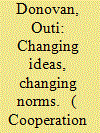

|
|
|
|
|
| Summary/Abstract |
Whilst much has been written on emergence of new norms in international politics, we know significantly less about changes to the ideas and assumptions that underpin such norms. Examined at micro-level, most norms consist of a set of ideas and assumptions that form the basis of what is considered as appropriate, legitimate or even the required thing to do. Far from being stable, ideational constitutions of norms can undergo significant changes in the course of the norm emergence process. Enquiring into such changes is important if we are to move beyond static and linear accounts of norm evolution. Using changes in the ideational constitution of the responsibility to protect – specifically, the de-emphasis of the responsibility to rebuild – as its vantage point, the analysis seeks to answer the following question: what drives change in ideational constitutions of international norms? The chief argument advanced in this article is that misalignments at the level of broader normative structures (external misalignments) and within norms (internal misalignments) result in changes in the ideational constitutions of emerging norms.
|
|
|
|
|
|
|
|
|
|
|
|
|
|
|
|
| 2 |
ID:
160809
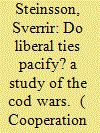

|
|
|
|
|
| Summary/Abstract |
The Cod Wars, three militarized interstate disputes between the UK and Iceland (1958–1961, 1972–1973, 1975–1976), have often been presented as an egregious exception to the liberal peace. There are, however, few comprehensive analyses of the liberal dimensions of the Cod Wars. This article comprehensively analyses the ways in which each of the Cod Wars is consistent or inconsistent with the liberal peace. I find that while the supposedly pacifying factors of the liberal peace – democracy, trade and institutional ties – effectively made the disputes more contentious, they also ensured that escalation to actual war was impossible.
|
|
|
|
|
|
|
|
|
|
|
|
|
|
|
|
| 3 |
ID:
160810
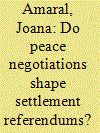

|
|
|
|
|
| Summary/Abstract |
Peace negotiations have traditionally aimed at reaching a negotiated settlement between political representatives in conflict settings. However, these settlements have seldom been rejected in referendums. This article uncovers whether the way peace negotiations are conducted influences peace settlement referendum outcomes in order to determine if and how they can better foster public support for peace settlements. It analyses and compares if and how specific characteristics of the Annan Plan and the Good Friday Agreement negotiations influenced the rejection of the former in 2004, and the acceptance of the latter in 1998, in their respective referendums in Cyprus and Northern Ireland. Through the qualitative analysis of elite interviews and documental data, it demonstrates that political inclusivity, civil society engagement and the public exposure of the negotiations shaped the opposing outcomes of the two cases, as well as differences in the support given by the local communities. It argues that peace settlement referendums require less secretive and more inclusive negotiation processes, which can better foster political support and civic mobilisation, and inform and engage the wider communities at earlier stages of the peace process.
|
|
|
|
|
|
|
|
|
|
|
|
|
|
|
|
| 4 |
ID:
160807
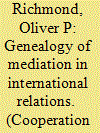

|
|
|
|
|
| Summary/Abstract |
What does it mean to mediate in the contemporary world? During the Cold War, and since, various forms of international intervention have maintained a fragile strategic and territorially sovereign balance between states and their elite leaders, as in Cyprus or the Middle East, or built new states and inculcated new norms. In the post-Cold War era intervention and mediation shifted beyond the balance of power and towards the liberal peace, as in Bosnia-Herzegovina, Kosovo, and Timor Leste. In the case of Northern Ireland, identity, territorial sovereignty, and the nature of governance also began to be mediated, leading to hints of complex, post-liberal formulations. This article offers and evaluates a genealogy of the evolution of international mediation.
|
|
|
|
|
|
|
|
|
|
|
|
|
|
|
|
| 5 |
ID:
160808
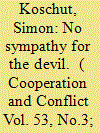

|
|
|
|
|
| Summary/Abstract |
Constructivists claim that the democratic peace is socially constructed via mutual recognition between liberal subjects. Mutual recognition is rooted in shared moral attitudes and cognitive perceptions, thereby creating liberal intersubjectivity. What is largely missing from these accounts is the fact that shared meanings and identities are not solely rooted in cognitive perceptions and moral attitudes but significantly depend upon shared emotions that underpin and reproduce intersubjectivity. Building on interdisciplinary insights from social constructivist emotion theories, it is argued here that collectively shared emotions provide a way by which liberal subjects choose particular meaning frames and interpretations, which help align and sustain mutual attitudes and perceptions in constructing categories of ‘us’ and ‘them.’ Accordingly, the theoretical question concerning how liberal democracies recognize each other as friends can be more fully answered by the high degree of emotional convergence among them. Moreover, I suggest that it is precisely this emotional convergence that underpins the way liberal selves construct non-liberal others as their enemies.
|
|
|
|
|
|
|
|
|
|
|
|
|
|
|
|
| 6 |
ID:
160813
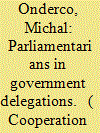

|
|
|
|
|
| Summary/Abstract |
Why do governments include parliamentarians in the delegations to international negotiations? Conduct of the diplomatic negotiations is among the most tightly controlled prerogatives of the executive, and executives have been historically dominant in the conduct of foreign policy. This article draws on the participation of members of parliaments in national delegations to the Review Conferences of the Non-Proliferation Treaty over the past 40 years. The emerging patterns show that legitimation through oversight is unlikely to be the reason for participation. Drawing on literature on institutional variation in legislative–executive relations, the data indicate that executives are more interested in co-opting the parliamentarians, in order to make them less opposed to the government’s policy.
|
|
|
|
|
|
|
|
|
|
|
|
|
|
|
|
| 7 |
ID:
160811


|
|
|
|
|
| Summary/Abstract |
This article explains the creation of the European Institute of Peace (EIP) in May 2014. Combining constructivist insights on policy ideas with a framing approach, it proposes a conceptual framework to analyse the dynamics of interaction between state and non-state actors (NSAs) with regard to formulating new policies and creating new institutions. Focusing on the role of frame entrepreneurs, framing strategies and frame resonance, it argues that the creation of the EIP was a result of framing undertaken by an advocacy coalition in which Sweden and Finland, together with specialized NGOs and individual Members of the European Parliament (MEPs), played the role of frame entrepreneurs. This advocacy coalition managed to convince a number of European states there was a certain gap in the EU’s mediation capacities and that a new institution independent of the EU was needed to address it. The limited degree of frame resonance among the majority of EU member states and their reluctance to join the institute explain why the EIP initiative struggled to receive broad political support.
|
|
|
|
|
|
|
|
|
|
|
|
|
|
|
|
|
|
|
|
|